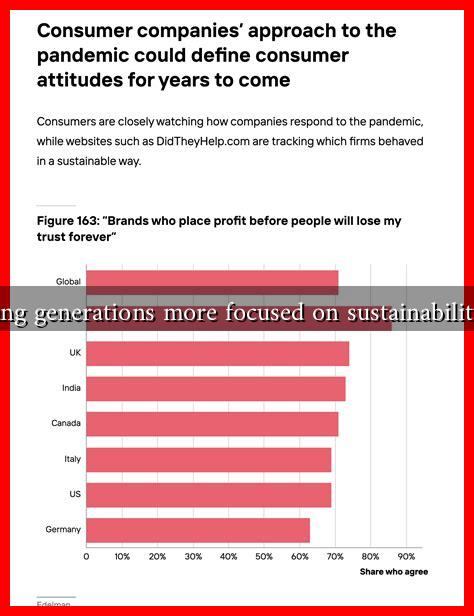-
Table of Contents
Are Young Generations More Focused on Sustainability Trends?
In recent years, the conversation around sustainability has gained unprecedented momentum, particularly among younger generations. Millennials and Generation Z are often heralded as the torchbearers of sustainability, advocating for environmental responsibility and ethical consumption. But what drives this focus on sustainability, and how does it manifest in their behaviors and choices? This article delves into the motivations, trends, and implications of the younger generations’ commitment to sustainability.
The Motivations Behind Sustainability Focus
Several factors contribute to the heightened awareness and commitment to sustainability among young people:
- Climate Change Awareness: With the increasing visibility of climate change impacts, such as wildfires, floods, and rising sea levels, young people are more aware of the urgent need for action. According to a 2021 survey by the Pew Research Center, 67% of Gen Z respondents expressed that climate change is a major threat to their generation.
- Access to Information: The digital age has made information more accessible than ever. Young people can easily educate themselves about environmental issues through social media, documentaries, and online courses.
- Social Responsibility: Younger generations are more inclined to support brands and companies that align with their values. They often prioritize ethical consumption, seeking out products that are sustainably sourced and produced.
Trends in Sustainable Practices
The commitment to sustainability is reflected in various trends among young consumers:
- Eco-Friendly Products: Brands like Patagonia and Allbirds have gained popularity among younger consumers for their commitment to sustainability. These companies use recycled materials and promote ethical labor practices.
- Plant-Based Diets: The rise of plant-based diets is another significant trend. A report from the Good Food Institute indicates that 48% of Gen Z is actively trying to reduce their meat consumption, driven by health and environmental concerns.
- Second-Hand Shopping: Thrifting and buying second-hand items have become fashionable among young people. Platforms like Depop and Poshmark have seen a surge in popularity, allowing users to buy and sell pre-owned clothing, thus promoting a circular economy.
Case Studies: Young Activists Leading the Charge
Young activists have played a pivotal role in raising awareness and pushing for policy changes related to sustainability:
- Greta Thunberg: The Swedish climate activist has inspired millions with her “Fridays for Future” movement, encouraging students worldwide to strike for climate action. Her efforts have brought global attention to the urgency of climate change.
- Extinction Rebellion Youth: This youth-led branch of the environmental movement has organized protests and campaigns to demand government action on climate change, emphasizing the need for immediate and radical change.
Statistics Highlighting the Shift
Several studies underscore the shift in consumer behavior among younger generations:
- A 2020 survey by Nielsen found that 73% of millennials are willing to pay more for sustainable products.
- The same survey revealed that 81% of millennials expect brands to be environmentally responsible.
- According to a report by McKinsey, 67% of Gen Z consumers are willing to pay more for sustainable products compared to 55% of millennials.
Challenges and Criticisms
Despite the positive trends, there are challenges and criticisms regarding the sustainability movement among young generations:
- Greenwashing: Many companies engage in “greenwashing,” where they falsely promote their products as environmentally friendly. This can lead to skepticism among consumers.
- Accessibility: Sustainable products can often be more expensive, making them less accessible to lower-income individuals.
Conclusion: A Sustainable Future
The younger generations are undoubtedly more focused on sustainability trends, driven by a combination of awareness, access to information, and a desire for social responsibility. Their commitment is reshaping consumer behavior and pushing brands to adopt more sustainable practices. While challenges remain, the momentum generated by young activists and consumers is paving the way for a more sustainable future. As they continue to advocate for change, it is crucial for society to support their efforts and work towards a more sustainable world.
For further reading on sustainability trends and consumer behavior, you can explore resources from the Nielsen and McKinsey.

